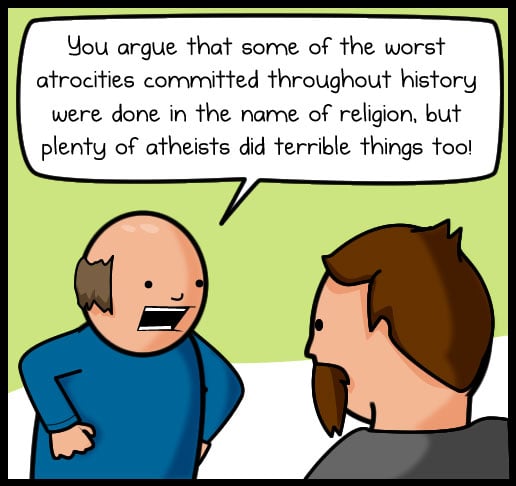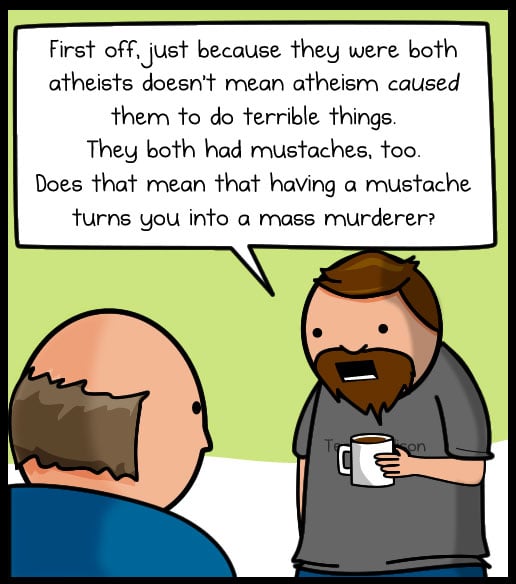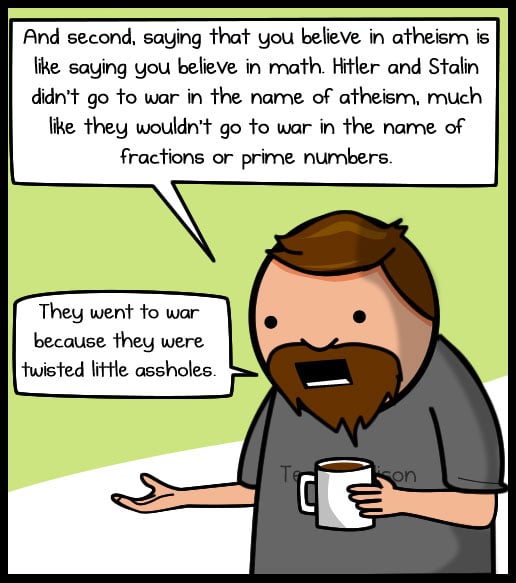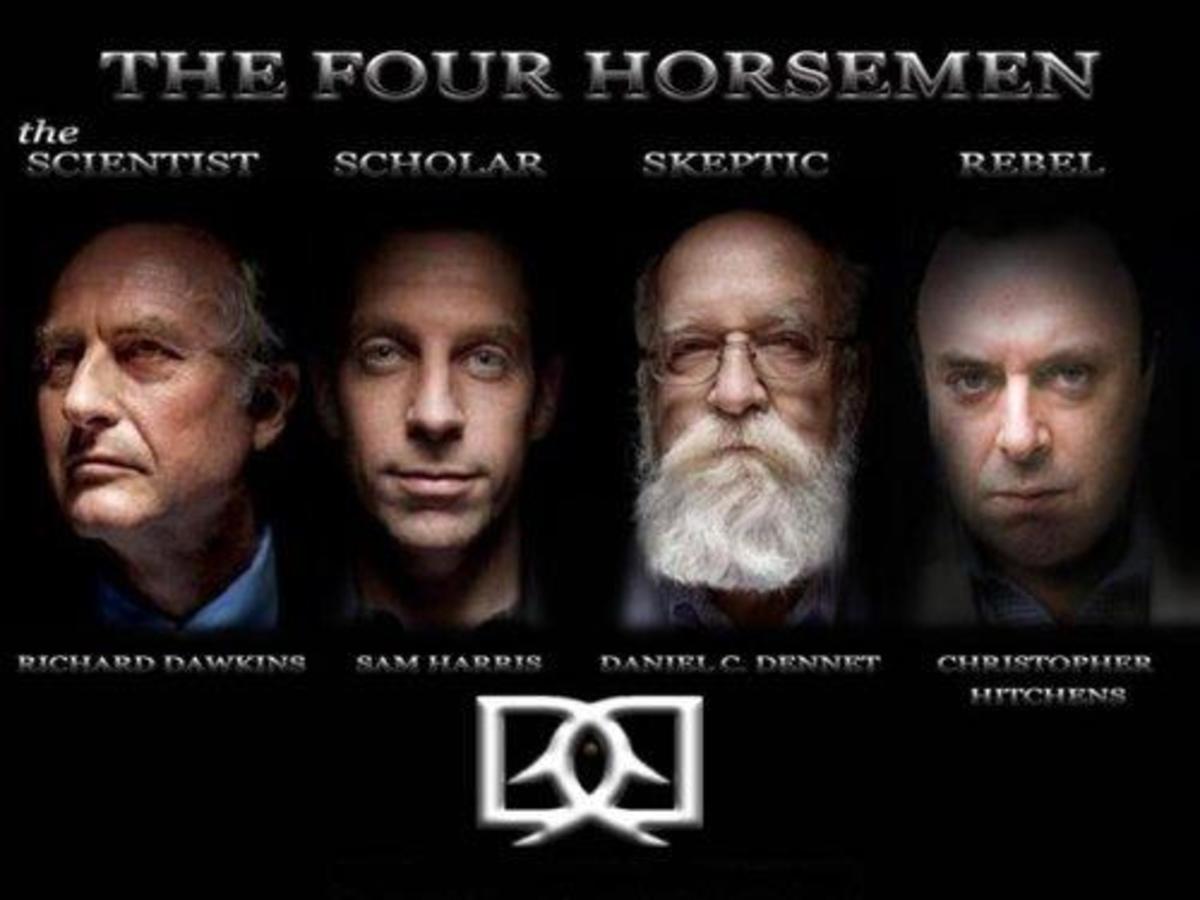War in the Name of Religion
War in the Name of Atheism?
Wouldn't you easily say how silly of an idea it is to think there would ever be a war in the name of atheism?
Well there hasn't been a war in the name of atheism but it wouldn't be a far stretch to say atheistic ideologies have propagated a war and some of the most violent tragedies this world has ever known.
This article will attempt to address the argumentation and rhetoric of a popular artist's comic titled, "War in the name of atheism."
The author of this article is openly Christian and the bias will be clear. Even so, the object is not necessarily disprove or discredit the comic artists point of view, but to demonstrate the errors in the reasoning presented in an objective manner.
You can view the comic here. (Hold down the Control button and select the link to open it in a new tab, so you can save the page. If you end up on the author's website for a long time, it is understandable because the guy is hilarious and he makes very many funny comic.)

The Issue isn't Necessarily War
The comic begins with a bald, argumentative character seemingly defending religion by attacking atheism and suggesting atheists have made some poor choices:
"You argue that some of the worst atrocities committed throughout history were done in the name of religion, but plenty of atheists did terrible things too!"
In this first panel, the antagonist is not identified as religious necessarily, yet attempting to defend a religious viewpoint. The first issue that arises and is not initially an error on the comic artists behalf, is the red herring argumentation used by the antagonist. While the character should be delving into presuppositional issues defining atrocities and injustice, he simply diverts the attention from the initial argument and places it on the seeming protagonist.
While this type of argumentation might be used often, it doesn't answer the initial objection of, "Religion cannot be true because evil has been committed in its name."
The comic author might be presenting the absurdity of arguing in such a manner, of which it is technically a fallacy and should be demonstrated as such. The issue that arises is then whether the comic author is knowingly presenting a fallacious argument from his opposition in order to gain an advantage. This would be considered a Straw Man fallacy and would demonstrated the author's unwillingness or inability to interact with an opponents position.

The second panel then shows the little bald antagonist concluding his argument,
My pastor told me that Adolf Hitler and Joseph Stalin were BOTH atheists.*
What does that tell you about atheism?
[Comic] Author's note: Hitler wasn't actually an atheist. He was a Christian.
The reasoning must be, "If my religion is invalid because evil was done in its name, then your atheism is invalid because evil was done in the name of atheism." While again, this might be used as argumentation, it is simply diverting the burden of proof and then distracting from the real objections or issues.
The antagonist also uses an Appeal to Authority in referencing his pastor. While his pastor might be a smart man, it would be wise to fact check and make sure things you would tout as true, particularly things you are not privy on, are actually true.
Revealing the Antagonist/Opposition
Within this panel we are also able to narrow in on the particular religion of the antagonist, potentially Christianity. From the comic authors past comics, he doesn't distinguish between denominations and combines Mormonism, Roman Catholicism and Protestantism under the same general title of religion, of which there are major differences in belief and ideologies. This is simply noteworthy, but not a particular point of dispute.

Mustaches and Mass Murder
This the third panel, the protagonist calmly addresses the livid bald fellow.
"First off, just because they were both atheists doesn't mean atheism caused them to do terrible things. They both had mustaches, too. Does that mean having a mustache turns you into a mass murderer?"
The issue shouldn't revolve around whether atheism caused a person to commit atrocious acts, but whether one can consistently justify committing acts that should be considered terrible or atrocious. It is clearly fallacious to suggest that growing a mustache*1 or mathematics*2 would provide an ideology that could sustain justification for any sort of behavior, so using these as parallels with atheism is flawed in itself, considering atheism comes from a materialistic or naturalistic worldview.
*1Mustaches do not necessitate a particular worldview and are arbitrarily wrought. Well, if you worship Salvador Dali, Tom Selleck or Chuck Norris, then a mustache would be foundational.
*2Mathematics seem to be often be considered axiomatic and used with considering a rationale for their reliability or existence. It is arguable that a materialistic worldview lacks a rationale for explaining the existence of math or the consistency of anything.

Atheism and Wars
In the fourth panel, the antagonist with the cool shirt continues:
"And second, saying that you believe in atheism is like saying you believe in math. Hitler and Stalin didn't go to war in the name of atheism, much like they wouldn't go to war in the name of fractions or prime numbers.
They went to war because they were twisted little a**holes."
Isolating Wars Caused by Atheism
While it should be addressed that there has been no war caused solely by atheism or with a fair assessment, any religion, atheistic worldviews have been the backbone for some of the most atrocious acts ever committed. Where as wars and murders have been justified by Christianity, this justification is not consistent with the tenants of Christianity. The same cannot be said of atrocious acts committed by atheists, where there is ample ability to consistently justify murders and atrocities.
Taking the author's created scenario, the position the protagonist should be defending is that there have not been atrocities committed in the name of atheism. The diversion to war solely is a sure way to appear to win the confrontation, but doesn't address the initial issue.
We could say there hasn't been a terrible thing done in the name of atheism, but it wouldn't be difficult to demonstrate a correlation between atheism and the behavior of men who espoused atheistic beliefs. (Not a causation, but a correlation.)
While this would be turned around with Christianity, the difference between the atheistic outlook and the Christian outlook is that there is no way to justify propagation of atrocities with consistent Christian perspective. (It is understand that folks will do things in the name of Christianity, horrible things, but they cannot do it justified by Christianity.)
Believing in Atheism is like Believing in Math
The meaning of this is meant to demonstrate that the nonexistence of God is as clear as the existence of math. Because it is so well documented that math exists, works and is commonly used, there is really no need to justify it because it is obvious. (Concluding since God is not like math, then it is obvious that He does not exist.)
This is a perplexity of the atheistic worldview, particularly the materialism or naturalism that often accompanies it. While we do use math regularly and it is generally accepted as existing, this is done so in a manner that is never questioned by the atheist. Math is an abstract concept, while demonstrated to work, has no material aspect with which to fit in the naturalistic worldview.
To return to the argumentation, atheism is not like math in the sense that it should be obvious. Atheism is not like math also in the sense that math cannot fit in the common atheistic worldview. Math exists abstractly and is intangible. This assertion is simply unattainable and when examined, can be seen to be inaccurate.

Outside Application and Conclusion
The last panel is a rendering of Nazi's battling it out in the name of math with mustaches.
The greatest concern of mine, personally, is that there is recognition that one can believe in something yet use that ideology wrongly. As demonstrated that one can be an atheist, but that doesn't necessitate violence. In the same sense, one can be a Christian, but that doesn't necessitate atrocities.
There is a huge inconsistency when someone commits atrocities in the name of Christianity. The plain teaching is that justice and vengeance is to be carried out by the Creator, not by the creation. When someone uses Christianity as an excuse to perform some harrowing act, they do so in a rebellious manner, not following the teaching of Christianity, but their one selfish or mislead desires.
Another point is that someone's behavior doesn't disprove an ideology. Just because an atheist does something considered evil doesn't mean what he believes is wrong. It just means they did something evil. Same goes for Christians who bomb abortion clinics. This is not a consistent behavior with Christianity, but a derivation and does not disprove anything.
Finally, the atheist who says their is evil is hard pressed to come up with a consistent definition of evil, or malice, or injustice, etc. An argument is often put forth that because God allows evil or does things that the atheist calls evil, then He contradicts Himself and does not exist. But the issue is then whether the atheist has a foundation for which to call something evil. This is something that takes time to flesh out, but essentially if the atheist cannot give a consistent rationale for good and evil, then their observations or declarations are simply arbitrary and it would be suitable to arbitrarily declare their wrong. (If you wish to answer a fool according to their folly.)
Feel free to interact and I look forward to the upcoming discussions.








